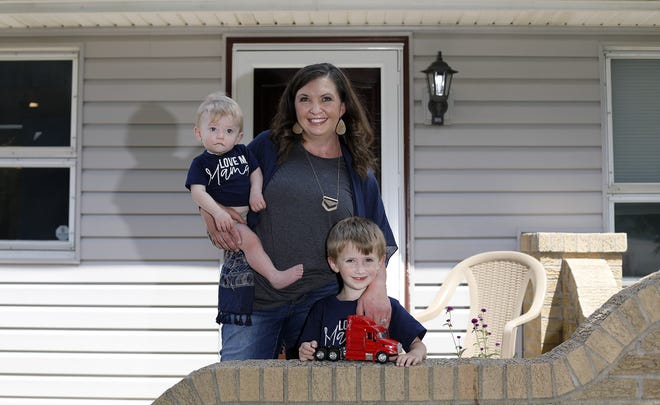
Lyndsey Wilcox thought she was going to die when she had her first child.
The Mount Gillead mother lost both of her feet at age 12 after a routine surgery for her scoliosis went south. When her doctor told her she needed a cesarean-section, she had flashbacks to her last invasive procedure.
The uneasiness didn't stop after Clayton was born, either. Wilcox said depression consumed her to the point that she didn't go back to work and can't remember the first three months of her son's life.
"It was an absolutely horrible time," Wilcox said. "Even after my amputations, I was never in such a depression like that."
The birth of her second son, Coleton, was a different story — and she has doulas to thank for that.
Now, Ohio lawmakers are pushing legislation that would provide greater access to doula care for mothers who want additional support during the birthing process. Proponents see the measure as a way to combat the state's poor infant mortality rate, particularly among families of color who don't feel heard by their doctors.
"We need health care providers to take everyone’s concerns seriously and address their needs at that moment and to not be dismissive," said former state Rep. Erica Crawley.
'Birth is treated as an illness'
Doulas have one goal, albeit a lofty one: Provide birthing people with emotional, physical and logistical support to ensure mother and child are alive, healthy and not traumatized by the experience. That help could come before and during the birth, or afterward as the new parent adjusts to life with their child.
Too often, doulas say, those who give birth don't feel empowered to make their own decisions, such as whether to have a C-section or use an epidural.
"Birth is treated as an illness in a hospital," said Linsey Griffith of the Ohio Doula. "The entire hospital birth process is to mitigate risk. It’s not about making sure that the birthing person is respected and supported."
The challenges faced by Black families are even more stark. Ohio has one of the worst infant mortality rates in the country at 6.9 deaths per 1,000 live births, and the rate among Black babies sat at 14.3 in 2019.
Nationwide, Black people, Pacific Islanders and Native Americans experience disproportionately higher rates of infant mortality and pregnancy-related deaths. Griffith said the problem boils down to racism in the health care industry and an unwillingness to take women of color seriously.
"I can’t save you from a system that’s bent on killing you or dismissing you because of the color of your skin or your age or your gender," she said.

Crawley knows what it's like to feel powerless. When she had her twin girls, she said, she went into pre-term labor at 18 weeks and spent the rest of her pregnancy in the hospital, only to have an emergency C-section at 34 weeks. Afterward, she experienced excruciating pain in her abdomen and found out she had a pocket of blood in her pelvis.
The doctor's prescription? Go home and take some ibuprofen.
"My concerns, the amount of pain that I was in, was dismissed," Crawley said.
Bill aims to reduce barriers to doula care
The legislation introduced by Crawley and Rep. Tom Brinkman, R-Mt. Lookout, would create a doula advisory board that reports to the Board of Nursing and a certification process for doulas in Ohio that includes training on racial bias, health disparities and cultural competency. It also would create pilot programs within Medicaid and the Department of Rehabilitation and Correction, allowing those patients to access doula services.
Crawley left the Statehouse to serve as Franklin County commissioner, but Brinkman said he hopes to move the bill forward when lawmakers return from summer break in September.
Advocates say the Medicaid piece would give more people access to doula services, which in turn could curb infant and maternal mortality and help address racial disparities. But Crawley said it's just one piece of the puzzle: She believes the state should collect morbidity data and establish anti-racism training for health care providers.
Crawley also supported extending postpartum Medicaid coverage from 60 days to 12 months, something lawmakers added to the new state budget that will take effect when the federal government approves it.
Private insurance doesn't tend to cover doula care, either. Lauren Guren of Cleveland Heights said she used a birth doula for her first child, but also took advantage of post-birth care that helped curb her anxiety and get a good night's sleep. The doula provided assistance with pumping and helped her understand why her baby would cry for seemingly no reason.
“You are a complete different version of yourself, especially during those first six weeks," Guren said. "It gives you time for yourself, which is probably the most important thing."
Guren's insurance didn't cover the doula care, so she paid for it out of pocket — something she recognizes other families can't afford to do. Wilcox said her family is still paying their $1,200 bill after they tried and failed to get insurance to alleviate some of the burden.

Lack of doula support
Doulas are heartened by the proposed legislation, but they have some concerns, too.
Griffith, of the Ohio Doula, said she doesn't want to see doula care beholden to outside regulators that don't understand the practice. She also noted that doulas can't save women on their own and worries if outcomes don't improve under the pilot program, officials will assume it's because doula care doesn't work.
The bill also doesn't create pathways to inform people about doula care, said CLEbaby founder Ashley Sova, and obstetricians typically don't tell their patients that it's an option. That leaves doulas feeling unsupported and not integrated into the health care system.
It's not an easy job, either. Sova said doulas tend to take on the emotions of their clients and aren't paid enough to support their families.
Still, doulas believe the bill would be a good first step and could help steer Ohio families in the right direction.
"Doula service should not be something that is exclusive for those who can afford it out of pocket," Griffith said.
Haley BeMiller is a reporter for the USA TODAY Network Ohio Bureau, which serves the Columbus Dispatch, Cincinnati Enquirer, Akron Beacon Journal and 18 other affiliated news organizations across Ohio.
Source link







